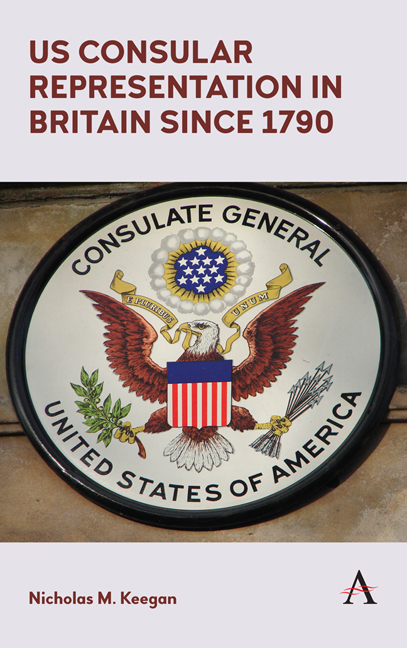Book contents
- Frontmatter
- Dedication
- Contents
- List of Illustrations
- Foreword
- Preface
- Acknowledgements
- Introduction
- PART 1
- PART 2
- PART 3
- Chapter Six Consular Posts and Consular Agencies in Major Cities
- Chapter Seven Belfast
- Chapter Eight Birmingham
- Chapter Nine Bradford
- Chapter Ten Bristol
- Chapter Eleven Cardiff
- Chapter Twelve Dublin
- Chapter Thirteen Dundee
- Chapter Fourteen Dunfermline
- Chapter Fifteen Edinburgh and Leith
- Chapter Sixteen Falmouth
- Chapter Seventeen Liverpool
- Chapter Eighteen London
- Chapter Nineteen Newcastle upon Tyne
- Chapter Twenty Southampton
- Chapter Twenty-One Stoke on Trent
- Chapter Twenty-Two An Evolving, Adaptive Service
- Appendix: Locations and Categories of Consular Offices
- Notes
- Sources
- Bibliography
- Index
Chapter Twenty-Two - An Evolving, Adaptive Service
from PART 3
Published online by Cambridge University Press: 21 June 2018
- Frontmatter
- Dedication
- Contents
- List of Illustrations
- Foreword
- Preface
- Acknowledgements
- Introduction
- PART 1
- PART 2
- PART 3
- Chapter Six Consular Posts and Consular Agencies in Major Cities
- Chapter Seven Belfast
- Chapter Eight Birmingham
- Chapter Nine Bradford
- Chapter Ten Bristol
- Chapter Eleven Cardiff
- Chapter Twelve Dublin
- Chapter Thirteen Dundee
- Chapter Fourteen Dunfermline
- Chapter Fifteen Edinburgh and Leith
- Chapter Sixteen Falmouth
- Chapter Seventeen Liverpool
- Chapter Eighteen London
- Chapter Nineteen Newcastle upon Tyne
- Chapter Twenty Southampton
- Chapter Twenty-One Stoke on Trent
- Chapter Twenty-Two An Evolving, Adaptive Service
- Appendix: Locations and Categories of Consular Offices
- Notes
- Sources
- Bibliography
- Index
Summary
The book has provided a tour d'horizon of the early US Consular Service and its modern successor and of their activities in Britain from 1790 to the present day. There is no doubt that considerable improvements have been made in the institution over that period and that it continues to develop, taking advantage of new technological innovations. Despite this, there remains a feature that not only has never been tackled but on the contrary has seen an increase. Namely, political appointments.
Although the United States came late to establishing a consular service compared to European countries such as Britain, France, Portugal and the Netherlands it was a quick learner. Yet it was slow (a) to take account of the many criticisms levelled at the standards of its service by businessmen and others, and (b) to rid itself of the questionable practice of appointing its consuls on the basis of who they knew, rather than what they knew, and of making financial contributions to presidential campaigns, the so-called spoils system. Pioneers such as Wilbur Carr, chief of the Consular Bureau and later Director of the Consular Service, were well aware of the deficiencies of the service and managed slowly to raise professional standards to the level we now see and expect today. Their efforts were helped by the merger of the separate Consular Service and Diplomatic Service into the Foreign Service in 1924. Nowadays Foreign Service officers who have served as consuls, or in other career tracks, can and do go on to senior non-consular posts in embassies, and non-consular staff in embassies can and do go on to posts in consulates. We need only look at some of those officers who have served as consul general in Belfast to see how this works in practice, all of them career members of the Foreign Service. Kathleen Stephens (1995– 1998) was later in her career appointed ambassador to the Republic of Korea; Barbara J. Stephenson (2001– 2004) was later ambassador to Panama, and in 2010 was appointed Deputy Chief of Mission at the London Embassy; Susan M. Elliott (2007– 2009) transferred to the Moscow Embassy as minister counselor for political affairs and was then appointed as ambassador to Tajikistan; Gregory S. Burton (2012– 2015) came from a senior post at the embassy in Afghanistan.
- Type
- Chapter
- Information
- US Consular Representation in Britain since 1790 , pp. 235 - 240Publisher: Anthem PressPrint publication year: 2018



